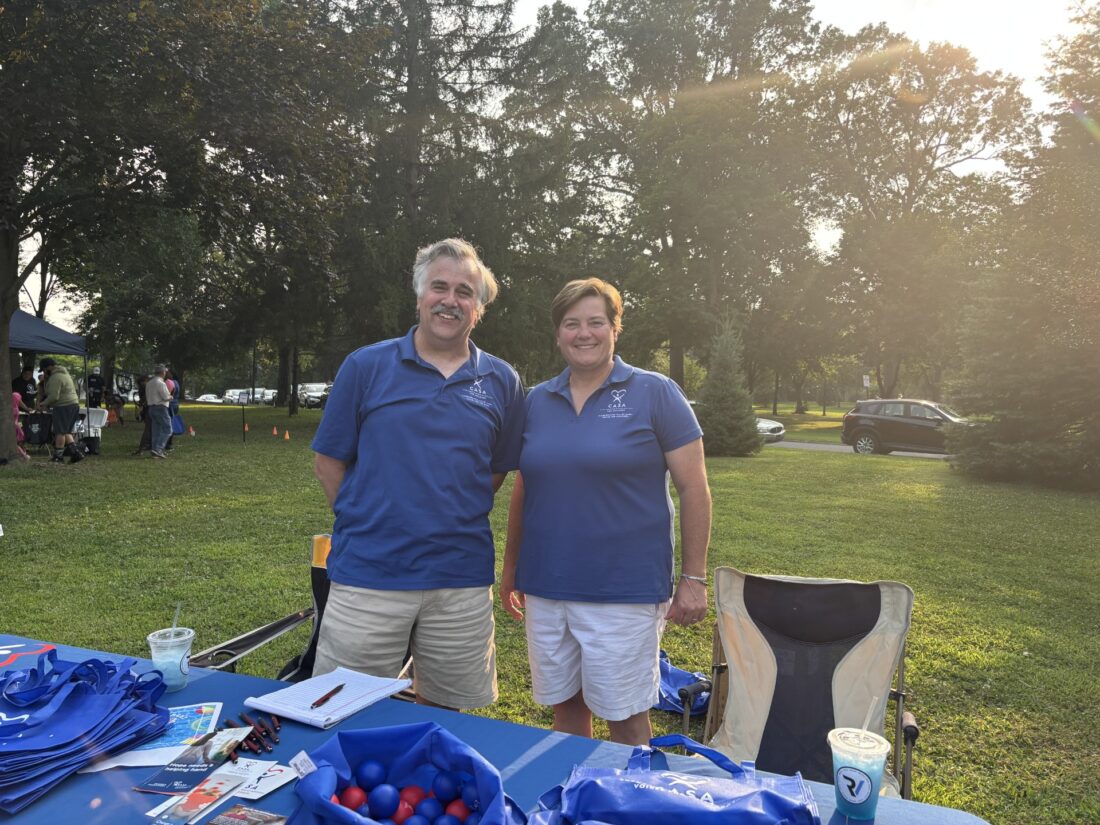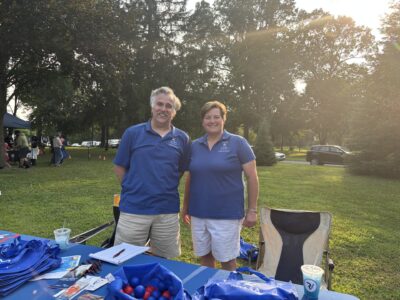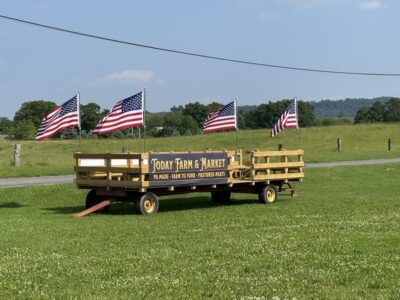Court Appointed Special Advocate program helps children

PHOTO PROVIDED CASA volunteers staff a atable at National Night Out in Brandon Park.
Not all superheroes wear capes and fly in the air, some serve as a Court Appointed Special Advocate (CASA), volunteering to be there for children who have been placed in the court system due to abuse or neglect.
Being a CASA volunteer is not easy, helping children who are dealing with situations that can be horrific. As Corey Mowrey, who has served on the board of Susquehanna Valley CASA (SVCASA) for twelve years, most recently as president, said, “We do tell people, you know, there’s easier volunteer work. There’s a lot of worthy causes, you know.”
Part of the process of becoming a volunteer is the 30 hours of online training that must be completed. Then there are the background checks that are mandated in order to work with children.
“There’s an interview process on the front end, just to make sure that it makes sense, that the potential volunteer, prospective volunteer, knows what they’re getting into. And that we’ve recognized if there are any red flags that could prevent this person from being able to serve as a CASA volunteer,” Mowrey explained.
“It’s a lot to digest everything from, you know, trauma and the court system and just kind of like understanding Children Services laws. There’s a lot that they’re trying to digest, over that five-week period. Then they are sworn in by a judge, and at that point they are assigned a case,” he said.
“There’s a lot of steps. You have to really have a passion for it, to want to go through all that. Then you really start the hard work,” he added.
The volunteer acts as an advocate for the child or children in the system.Part of that is investigating what is going on with that child and what brought them to that point. Mowrey said volunteers spend about 15 hours a month working on their cases, depending on the circumstances. Some spend more if they have the availability.
“The judge has deemed the child to be a dependent of the court because of circumstances at home that are no fault of their own. So our volunteers, after they’re assigned, they investigate. They have a court order that gives them access to any and all information, medical records, counseling records, school records, IEPs (Individual Education Plans), they have the right to make visits to the home,” he said.
“Most of the cases that our CASA volunteers serve in are of such severity that the children are out of their natural home because of abuse and neglect. So a lot of times they’re in the foster care setting. But the volunteer will start with getting to know the child. It looks very different depending on the age of the child, whether that child can actually communicate and tell the volunteer their circumstances and, you know, relay information back and forth and develop a report, or if they’re a baby, you know, it looks very different depending on the ages, but the first step is getting to know the child, the child’s circumstances, understanding what that child’s world looks like, what’s going on, what are the the issues that cause that child to become involved or be deemed to depend on the state in the first place,” he continued.
“And then the volunteer with gathering all that information directly through the child, through the family, through the foster family, through teachers or counselors or medical providers, through documentation, they use their training to put together a report that goes to the judge, and that report gives a detailed summary of that child’s life, what’s going on, but importantly, it includes recommendations that the volunteer believes the court should adopt and depending on what that recommendation or recommendations include, the court can order certain things to happen,” he said.
He cited a situation where the child has been abused because their parents are using drugs. The CASA volunteer might order that the parents be drug tested or go through drug and alcohol abuse treatment in order for the situation to be changed so that the child can return to the home.
“Most of the recommendations that our volunteers make are adopted by the court, and really we serve at the benefit of the judge. We are assigned to these cases because judges want an additional set of eyes and ears solely focused on that child or sibling set,” Mowrey said.
He noted that statistics show that cases are closed more expeditiously, on the average seven or eight months sooner if there is a CASA volunteer involved.
“They are closed in a permanent way…situations have been resolved in that we’re not just simply putting a band aid on it,” he said.
One reason the advocate can be so focused on each case, is because they only have one case. It may involve more than one child, but it is only one case.
“Children and youth and judges and the guardian ad litem, they all have multiple cases. And so it really does afford us the opportunity to really focus on that one child or one sibling group and help speak to the court from that perspective of just what is in their best interest,” said Kelly Vogel, Executive Director, SVCASA.
Right now there are 12 advocates that are actively working cases at SVCASA, but there are about 28 total. Some choose to be inactive for periods of time, either for personal reasons, or after coming off a case, Vogel said. There is that flexibility for the volunteers.
“Most cases go an average of 18 to 24 months from the initial visit or from the initial adjudicated dependent to the point that they have some kind of permanency result, whether it’s going back to their family of origin or being adopted through either kinship or foster care or what, or aging out or aging out,” she said.
“So, it’s almost a year and a half to two years process most of the time. That’s pretty typical. And so some people will take six months or eight months off after a case, and then they’ll get another case,” she added.
“Once it is determined that the child is an adjudicated dependent in the court system-once the court says, yes these children need to be dependent, then you do some upfront work. You meet with them a minimum of once a month. But, you may be talking to the foster parents. You may be reaching out to the school to find out how they’re doing in school. And then maybe you’re meeting with the child themselves. That’s up to the volunteer, but we do ask them to do it at least once a month,” she said.
Vogel noted that some advocates meet with the children every other week because they feel it gives them a better understanding of who the child is.
The advocates also must attend court hearings, which can be every three to six months along with three people from SVCASA, so that they do not go alone.
Although it may seem overwhelming, Vogel said that the volunteers have shared with her that it’s very rewarding.
“I know one of our one of our volunteers, she’s been a volunteer for over 10 years, and I know the case she has right now is, I guess, one where the abuse was more extensive than she’s experienced before, but she feels so grateful to be a part of this child’s life, and that this child looks at her as somebody who’s consistent in the child’s life and somebody that they can count on, And and she’s developed a really good relationship with that kid,” Vogel said.
“Is it hard? Sure, it’s hard. It’s emotional. Because they’re kids, and we’re people who care about them. So, you know, there’s times that it is a big emotional challenge, and that’s why some people also like to take a few months off after a case, to just kind of reset themselves and make sure that, okay, I’m good. We do a lot of checking in with our volunteers,” she said.
“I think overall, the response is that they feel it is very, very rewarding. You know, it’s heavy stuff, but it’s good stuff,” she added.
For more information about volunteering, contact the SVCASA website to begin the process. The next training will be next month.
The group will also hold their annual Superhero 5k run-walk from 9:30 a.m. to 12 a.m. Sept. 27 at the Lewisburg Area Recreational Park. Then at 5 p.m. Nov. 6, they will hold their 12th annual Constellation of Hope fundraising gala at the Watson Inn, Watsontown. Both events offer opportunities to learn more about SVCASA’s work. Information about these events is also on their website:susquehannavalleycasa.com/events.


